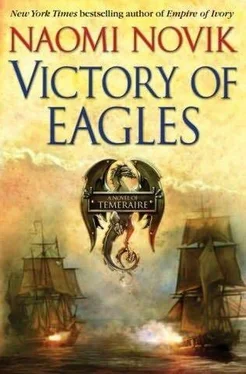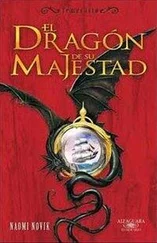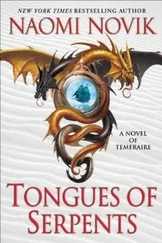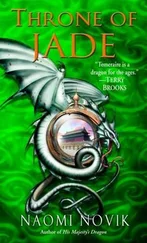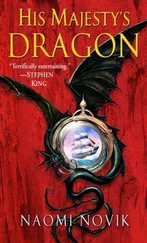“I suppose they will not be let to wander the ship,” she said, surprised, and he had to convey some sense of the natural order of a prison-ship: the dreadful frequency of scurvy and fever and dysentery, the misery and regular danger of rebellion.
He was sorry to find his descriptions borne out when they came to the Allegiance the next morning, at Sheerness Dockyard: it was not pleasant to see their familiar and faithful transport all at loose ends, her crew a sad and surly crowd of pressed landsmen, some of them not far removed from the poor wretches who could be heard—and smelled—down beneath, clanking restlessly in the irons which must restrain them, so close to shore. Nearly every able seaman had been plundered away by ships with nobler duties and captains with more influence than Riley, having perhaps been tainted by too much association with Laurence, could muster to keep them for such a mission. A grating was already rigged, and fresh bloodstains beneath showed it had lately seen use; the bo’sun and his mates were bodily shoving the men to their work.
Across the harbor, another vessel was making ready to go down the Thames, on the same wind which would keep the Allegiance in port a while longer. She made a stark contrast: a sailing barge, flat-bottomed and small next to the behemoth of the dragon transport, and manned to precision by a tiny handful of sailors all in black; even her sails were dyed black, and her sides had been freshly painted, so there was no waterline to mar her side. A great casket, black-and-gold-painted, was gently and respectfully being conveyed onto her, while her officers stood at attention.
“That is Nelson’s coffin,” Laurence said, when Temeraire quietly inquired; a hush had fallen over all the ship, and even the most bitter of the impressed landsmen had been silenced, by the fists of their fellows if not by a sense of decorum, while the casket was in view. Tears showed on hardened faces, and Laurence could hear one man sobbing like a child, somewhere up in the rigging. A confused prickling of tears stood in his own eyes.
Nelson had given Britain mastery of the sea at Trafalgar; from Copenhagen he had brought back eighteen prizes and secured the passages of the Baltic Sea. All the month before the battle at Shoe-buryness had been joined, he had with his fleet swept the Channel clean of French shipping and beaten away at the regular French flights, so Napoleon should have no reinforcements. The ships had concealed their flags and painted over their names, so no-one should realize he had returned, and for love of him not a man out of five thousand sailors and more had deserted, even while the ships hid in home ports.
His personal sins might have been excused, though Nelson had selfishly exposed his wife to the misery of his flagrant unfaithfulness, and his friend Lord Hamilton to the astonished censure of the world. If Lady Hamilton had rescued her reputation, by her heroic spy-work in the occupation, it did not redeem Nelson’s choice; but if, for so much victory and sacrifice, all these venial matters should have been passed over, there were worse evils to Nelson’s account. He had defended slavery, and without a qualm advocated the hideous murder of those thousands of dragons, allies and neutrals as well as their enemies, by the spreading of the plague: evils Laurence could never forgive, and whose consequence he would personally bear the rest of his life.
Yet for a moment, Laurence could feel nothing but the deepest wrenching misery, watching the barge heave off the dock and those black sails filling; a grief unburdened by judgment; a grief he might have felt wholeheartedly, in another life. Guns were firing as the barge passed away down the river: an impromptu thunder of salutes. A hurried struggle went forward on the deck behind them, and the Allegiance ’s ragged crew managed by simple weight of her massive thirty-twos to contribute a meaningful roar or two to the procession, though they could not yet fire a broadside in unison.
The barge vanished swiftly over the horizon, carried inland by wind and tide. Distantly the salutes went on, like a receding storm, and at last faded entirely. The Allegiance groaned softly at her anchors, and the unhappy life of the ship resumed behind him. Laurence breathed again. He had not wept, in the end.
Temeraire had watched the procession with interest; now he stretched his wings—cautiously, to keep them in line with the wind and not abreast of it—and asked, “Will we leave soon?”
“When the captain and the passengers are come aboard,” Laurence said. “In a few days, perhaps, if the wind turns fair.”
They, of course, had been required aboard earlier, as they were not passengers but prisoners; and if Laurence were disposed to forget their official status, the first lieutenant, Lord Purbeck, was not. A guard—a wholly useless guard, two Marines armed with muskets, whom Temeraire might accidentally have knocked over without noticing—had been placed on the steps to the dragondeck, and when Laurence looked for his things, they had been stowed in a small, dark cabin beside the stern ladderway, two decks down: as near to the gaol-deck as practical, without being right in it, and full of the stench. To this he was followed by the guard, and they looked as though they would have liked to keep him in it; until he said, “You may go up, then, and explain to Temeraire I am not allowed to come to him.”
The aviators began to come aboard irregularly: they were not an assembled crew, of course, with their own dragon, but rather were drifting over from Dover covert, by twos and threes, including two of the captains Jane had sent: both of them older men lately dropped to earth by the death of their former dragons, in the dreadful epidemic, long before anyone had looked for such an event; experienced men, who might have looked for long careers ahead of them. Another man they would take aboard in Gibraltar; three eggs were to be sent with them.
These were delivered, with great care and attention, by a party of three dragons. The eggs, swaddled in cotton wadding and lowered down into a nest built for them over the galley, were not what anyone would call a real prize: one Yellow Reaper, and one unfortunate cross between a Chequered Nettle and a Parnassian, who had somehow produced a shockingly small egg that looked more likely to produce a Winchester than a heavy-weight. The third, delivered by Arkady himself, was his own: or so he smugly informed them, and had been lately produced by Wringe. He was not at all sorry to see the egg go, convinced it was an especial honor to have it sent to a wide-open and unclaimed territory; although he stayed a long time lecturing Temeraire sternly on his duty of oversight and care, and extracting promises Temeraire should be sure the egg was not touched by anyone at all, and that only someone very rich should be permitted to become the captain.
“I am glad to see you again, before we go,” Laurence said, to Tharkay, awkwardly; they had not spoken, since that day in the camp, when Tharkay had so easily and so wrenchingly cut him to the bone; Laurence scarcely knew whether to apologize or to express gratitude.
“You need not bid me farewell, just yet; I am coming,” Tharkay said. “Captain Riley has been good enough to invite me as his guest.”
“I did not know you knew him,” Laurence said, as near as he could come to questioning.
“I did not,” Tharkay said, “but Captain Harcourt was good enough to introduce me. I am tolerably well in pocket, at present, thanks to your admiral’s generosity,” he added, seeing that Laurence was surprised, “and I have never been to Terra Australis; the journey tempts me.”
Wanderlust might drive a man across the ocean or to the farther side of the world; it would not drive him aboard a ship with one he despised, when funds would have allowed him to choose his passage. “Then I am glad we shall be shipmates,” Laurence said: as far as he could trust himself to express his feelings, without giving mortification to himself or any other.
Читать дальше
